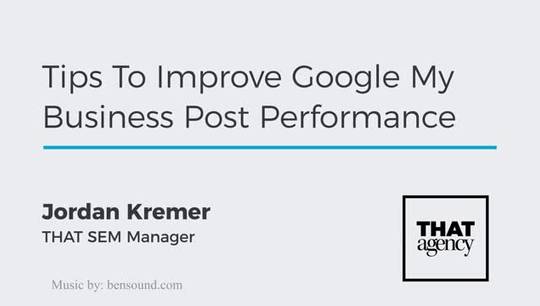Should You Avoid Stop Words for SEO?
Should you avoid stop words for SEO? Get the answer to this question and more from the THAT Agency blog - http://bit.ly/2C7gpN1
Hi there. I’m Katie Weedman. Today I’m going to tackle the hotly debated topic of SEO stop words.
Some SEO experts have insisted stop words be avoided. Others have argued stop words are necessary for grammar and clarity. As a member of the search engine marketing team at THAT Agency, I deal with SEO stop words daily. Here is my two-step program for navigating the nuances of SEO stop words.
Step 1. Understand why SEO stop words exist.
SEO stop words are short, succinct words – often prepositions or conjunctions – such as the, of, for, an, etc. These stop words are frequently ignored by search engines to save database space and to deliver search results faster.
For example, let’s say that a Google user types into the search bar, “What is the best seafood restaurant in Palm Beach?”. Google’s algorithm will filter out any words that aren’t adding meaning, and then provide the user with search results for “best seafood restaurant Palm Beach.”
This all happens behind the scenes, and the average Google user is none the wiser. In fact, it’s really a win-win scenario. The user still receives the desired search results AND he or she receives the results more quickly, because the eliminated stop words have shaved nanoseconds off the search engine results page load time.
Step 2 for navigating the nuances of SEO stop words is to realize that they are sometimes necessary.
Yes, despite being painted by some as fluff or filler, SEO stop words can be necessary to add meaning.
For example, there is a big difference between “who” and “The Who.” The former could be construed as a pronoun or as an abbreviation for the World Health Organization, while the latter is a band featuring the famous guitarist Pete Townsend.
In the example of “The Who,” “the” is the stop word. But, because “the” adds meaning, Google’s algorithm will pay attention to the “the” instead of eliminating it. Yes, Google’s algorithm is really THAT smart!
And yet, not everything is cut and dried. If you’re a WordPress user with the Yoast SEO plugin, you have likely noticed the plugin’s propensity to flag URLs containing SEO stop words as having a potentially negative impact on search engine rankings. This is not necessarily true.
Today’s search engine algorithms favor user experience. Avoiding SEO stop words even in times where they add meaning or are required for grammar would be unnatural and counterintuitive to providing a positive user experience.
Personally, when I see the Yoast WordPress SEO plugin’s stop words notification, it’s usually because the longtail keyword I am targeting in the slug contains SEO stop words. In those instances, I simply count the total characters in the URL. If the total is fewer than 75 characters, I give myself a mental green light and let it ride.
In conclusion, it’s ok to use stop words when necessary to add meaning, to be grammatically correct, and/or to target a longtail keyword in which a stop word appears.
As you can see, the smallest details matter in the world of SEO – and attention to detail takes time. If you’re a marketing manager or business owner, you’re probably short on time already. Let the search engine marketing team at THAT Agency navigate the nuances of SEO for you. Call 561-832-6262 or visit http://bit.ly/2C4a3y0 to request a proposal today – and be sure to follow us on social media for more helpful tips and information like this!
Facebook - https://www.facebook.com/thatagency/
Twitter - https://twitter.com/THAT_Agency
LinkedIn - https://www.linkedin.com/company/that





